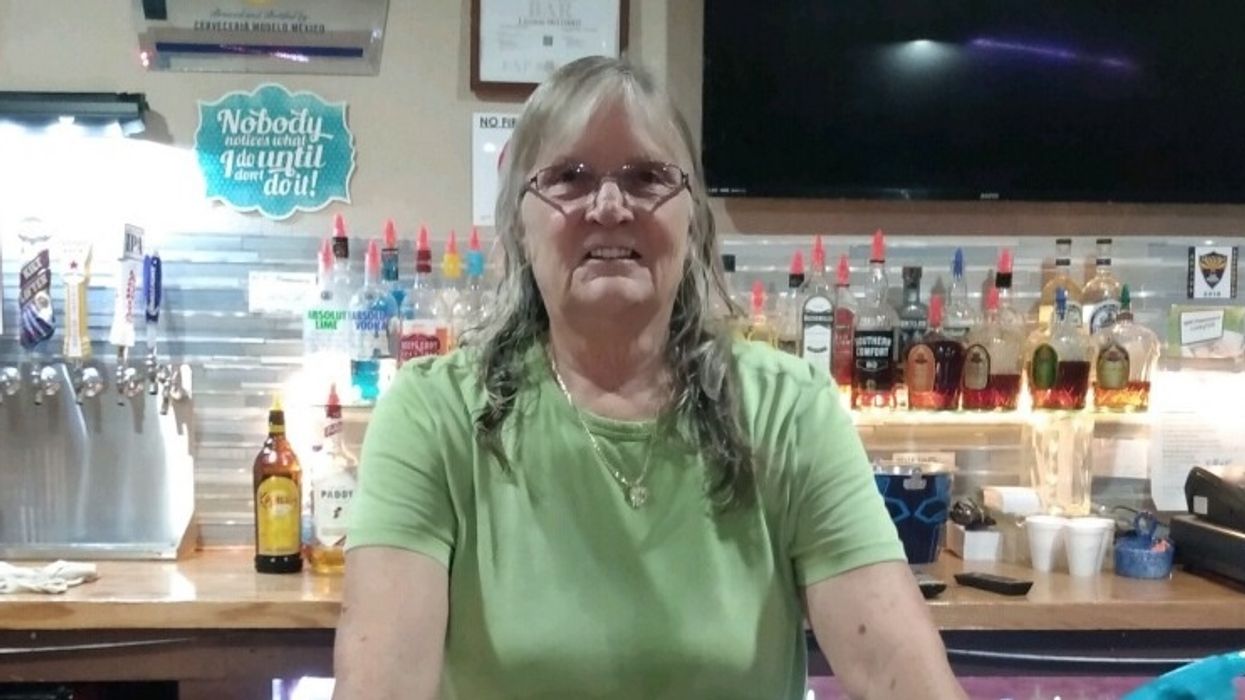
Deborah Wohle, owner of Lucky Strikes bar in Apache Junction, Arizona. (Courtesy photo)

Deborah Wohle owns a small, neighborhood bar in Apache Junction, Arizona, called Lucky Strikes. Her business has been financially devastated by COVID-19 lockdowns, and on the one day she opened up to offer takeout services in April, she was charged with a crime.
As a result, Wohle is facing thousands of dollars in fines from the misdemeanor, and from citations issued by the Arizona Department of Liquor. With her business barely surviving, she said she can't afford to pay, and she doesn't believe she did anything wrong.
"I've never done anything to anybody," Wohle said. "I'm just a business owner. … I just want to reopen and run my business."
When Republican Gov. Doug Ducey issued an executive order in late March shutting down or limiting operations for bars and restaurants, Wohle closed down Lucky Strikes.
Over the next few weeks, however, Wohle said she noticed other bars around the city operating by offering takeout, apparently in compliance with the executive order. Desperate to make ends meet and to enable her employees to work, she decided to do the same.
On April 19, Wohle posted on Facebook: "Lucky's will be open tomorrow from 4 to 10 p.m. hot dogs and brats. Karaoke. All food and drinks will be to go in the back parking lot. Hope to see all my friends are there."
Someone who saw the post sent a complaint to the Apache Junction Police Department. Sgt. Daniel Saldana called Wohle. Saldana wrote in the police report that he spoke to Wohle twice.
During the first call, he said he advised her about the executive order's rules for food and drink establishments. Wohle informed Saldana that she had spoken to Apache Junction Mayor Jeff Serdy, who viewed the setup outside her bar and approved it. Saldana told Wohle he would check whether anything had changed.
Saldana called Wohle again, and said he told her "no change has been made and that she needs to follow the emergency orders set forth by the Governor." Saldana wrote that Wohle agreed to abide by the order. Wohle said that after the call, she decided not to have karaoke to ensure she was in compliance.
The police report states that Officer Danny Campano drove by the bar twice, once at 5:15 p.m. and again at 5:36 p.m., recording the scene on his body camera on the second pass.
At 5:48 p.m. Campano, Saldana, and two other officers went to Lucky Strikes to confront Wohle about her gathering, which was reported to be about 20 people. Wohle had speakers set up playing music, and there were chairs and tables set up in the parking lot. Wohle said she made sure to distance them appropriately.
The officers cited her for violating the executive order and ordered her to disperse the gathering, which Wohle said she did. She faces a class 1 misdemeanor charge, which carries a maximum penalty of up to 6 months in jail and $2,500 in fines, plus surcharges. Her next court date is Aug. 5.
Mayor Serdy confirmed that he evaluated and approved Wohle's bar arrangement, but said Wohle may have gone too far by having speakers set up to play music. He said the citation would be inappropriate if she wasn't warned beforehand, but if police had warned her before citing her, then they acted appropriately.
Still, Serdy is supportive of Wohle and hopes that she isn't made to pay the fine.
"Our businesses have been punished enough, let's help them survive," Serdy said, referencing the damage done by COVID-19 and Ducey's executive orders.
Attorney Kurt Altman is working on Wohle's case pro bono, and said he believes that not only did Wohle not violate the executive order, but the order itself is unconstitutional.
"The executive order is incredibly unclear," Altman said. "Nobody knew if they were in compliance or noncompliance or what they were supposed to do. Quite frankly I don't think the governor knew what people could or couldn't do."
Wohle, meanwhile, is in a difficult situation. She said she took a loan out to pay her bills, but now that bars have again been shut down, she's quickly running out of money. Making matters worse, she's seeing her customers go to nearby restaurants, which are able to serve customers, at a reduced capacity.
After the lockdown order expired on May 15, a subsequent June 29 executive order again prohibited bars from doing anything except takeout service as the number of new COVID-19 cases increased. That order was renewed on July 23, and will be reevaluated every two weeks.
When asked how much longer the business could survive under current circumstances, Wohle's prognosis was grim.
"Not much longer," Wohle said. "Not much longer. My rent and utilities and everything still goes on, and I have no revenue coming in."
Wohle has organized a GoFundMe to help support her business and employees, as well as to pay for legal costs.